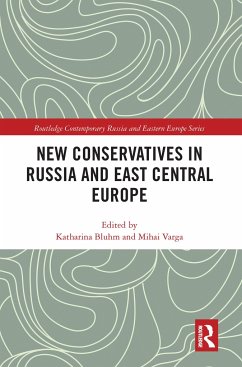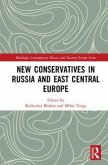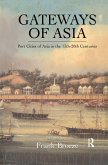This book explores the emergence, and in Poland, Hungary, and Russia the coming to power, of politicians and political parties rejecting the consensus around market reforms, democratization, and rule of law that has characterized moves toward an "open society" from the 1990s. It discusses how over the last decade these political actors, together with various think tanks, intellectual circles, and religious actors, have increasingly presented themselves as "conservatives," and outlines how these actors are developing a new local brand of conservatism as a full-fledged ideology that counters the perceived liberal overemphasis on individual rights and freedom, and differs from the ideology of the established, present-day conservative parties of Western Europe. Overall, the book argues that the "renaissance of conservatism" in these countries represents variations on a new, illiberal conservatism that aims to re-establish a strong state sovereignty defining and pursuing a national path of development.
New Conservatives is a highly important collection which offers far more than a standard set of well-researched case studies. Its original reframing of illiberal trends in post-Communist Europe as a new conservative challenge, and stress on reflexive actors rooted in the evolving civil and political societies of the region goes a long way to filling the widening gaps in current explanations that have been over-focused on party politics and over-reliant on generic models of a populist surge brought about by economic shocks and flagging Europeanization. - Seán Hanley, UCL School of Slavonic and East European Studies, London in The Slavonic and East European Review
This excellent study [...] focuses on three cases which are rarely combined, i.e. Russia, Poland and Hungary. Comparing them not only allows us to spot their differences and similarities (vide: the great conclusion chapter by the editors) but also enables a deeper understanding of conservatism in the realities of the post-communist East Central Europe. - Alicja Curanovic, University of Warsaw in TRAFO - Blog for Transregional Research
Over the past decade European democratic regimes have begun to take on the features of non-democracies by using legal restrictions on protest and constitutional amendments, refusing to register political parties and restricting referendums. This book focuses on how policymakers responsible for these changes self-legitimize and legitimize political decisions, which makes it a timely, interesting and relevant contribution to studies on illiberal democracies and contemporary political theory. - Joanna Rak, Adam Mickiewicz University, Poznan in JCMS - Journal of Common Market Studies
This excellent study [...] focuses on three cases which are rarely combined, i.e. Russia, Poland and Hungary. Comparing them not only allows us to spot their differences and similarities (vide: the great conclusion chapter by the editors) but also enables a deeper understanding of conservatism in the realities of the post-communist East Central Europe. - Alicja Curanovic, University of Warsaw in TRAFO - Blog for Transregional Research
Over the past decade European democratic regimes have begun to take on the features of non-democracies by using legal restrictions on protest and constitutional amendments, refusing to register political parties and restricting referendums. This book focuses on how policymakers responsible for these changes self-legitimize and legitimize political decisions, which makes it a timely, interesting and relevant contribution to studies on illiberal democracies and contemporary political theory. - Joanna Rak, Adam Mickiewicz University, Poznan in JCMS - Journal of Common Market Studies








